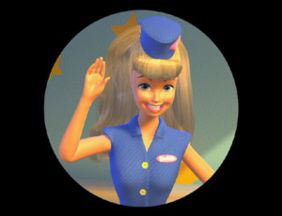Remember, kids, Barbie sez: “The power of the state should be predicated
on the consent of the governed, not the threat of force!”
Today, as part of a Patheos symposium on morality in animated films, I expand my emerging thesis on the New Disney as a source of cultural renewal. Included in the article is my capsule review of five of the New Disney’s films, such as Toy Story 3:
This, strange as it may seem, is a movie about politics. The nature of political community grows from our understanding of the meaning of human life, and the great political conflict of our own time is between two views that are contrasted in this movie. If we exist to serve a purpose higher than ourselves, the political community can have a standard of justice that transcends the will of the rulers. Hence the toys in a good child’s room, who exist to serve the child, have a free and virtuous social order. But if we have no higher purpose – if, as the villain declares, “we’re all just junk headed for the dump” – then our rulers will treat us accordingly. Hence the toys in the day care live in a prison camp. (WALL-E touched on similar themes, although in a more economic context; those who live for nothing but pleasure are fit for nothing but slavery.) Over against Hayao Miyazaki’s attempt to build an anti-political cosmos in Howl’s Moving Castle and The Wind Rises, Toy Story 3 upholds the nobility of the political vocation and the justice – articulated by no less a philosophical authority than Barbie herself – of government by the consent of the governed.
I may just have to write a book on all this. Your thoughts are, as always, appreciated!
